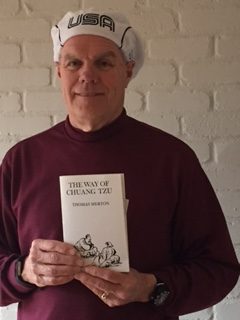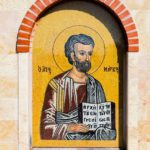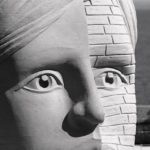 Thomas Merton says he cannot define le point vierge so he describes his sudden “realization” while on the corner of 4th and Walnut in Louisville with people in a shopping area:
Thomas Merton says he cannot define le point vierge so he describes his sudden “realization” while on the corner of 4th and Walnut in Louisville with people in a shopping area:
Then it was as if I saw the secret beauty in their hearts, the depths of their hearts where neither sin nor desire nor self-knowledge can reach, the core of their reality, the person that each one is in God’s eyes. … Again that expression, le pointe verge, (I cannot describe it) comes in here. At the center our being is a point of nothingness which is untouched by sin and by illusion, a point of pure truth, a point or spark which belongs entirely to God. … This little point…is the pure glory of God in us. …It is like a diamond, blazing with the invisible light of heaven. It is in every body.
Merton discusses “the secret beauty” as being in the hearts of the people in the crowd. Thinking of this makes me realize:
1. My heart and brain developed progressively as a fetus in my mother’s womb, and they are my connection with God or “The Universal Mind.”
2. My heart has its own nervous system with electromagnetic energy greater than my brain, and my heart’s electromagnetic energy is a source of communication as it can be detected as an energy wave.
3. Through my heart’s rhythm I can connect to the point in my heart of soulfulness, higher consciousness and spiritual rythmatic energy which entered my heart while I was a fetus in my mother’s womb.
Meister Eckhart teaches- St. John says: “See how great the love the Father has shown us that we are called the children of God.” Eckerd tells us we cannot be God’s child without having the same being as God’s child.
My connection with God- “The Universal Mind”- is found in my heart. By connecting my heart’s rhythm with the universal rhythm I can get to the point in my heart Merton refers to as le point verge.
Post Footer automatically generated by Add Post Footer Plugin for wordpress.

 WHEN THE SHOE FITS
WHEN THE SHOE FITS The first step is “a loosening of the body, without which” nothing can be properly done. This “physical loosening must … be continued in a mental and spiritual loosening, so as to make the mind not only agile, but free; agile because of its freedom, and free because of its original agility; and this original agility is essentially different from everything that is usually understood by mental agility.
The first step is “a loosening of the body, without which” nothing can be properly done. This “physical loosening must … be continued in a mental and spiritual loosening, so as to make the mind not only agile, but free; agile because of its freedom, and free because of its original agility; and this original agility is essentially different from everything that is usually understood by mental agility. There is nothing more generous than a person who sees the relation of the world with God “in all troubles and the most likely of dangers.” It may be a matter of facing death, marching into the unknown, or working like a slave. In all such things the person finds the fullness of his relationship with God engulfing him instantly.
There is nothing more generous than a person who sees the relation of the world with God “in all troubles and the most likely of dangers.” It may be a matter of facing death, marching into the unknown, or working like a slave. In all such things the person finds the fullness of his relationship with God engulfing him instantly. “The collective name for the ripe fruits of religion in a character is
“The collective name for the ripe fruits of religion in a character is 
 The new will which I began to have was not yet strong enough to overcome the other will, strengthened by long indulgence. So these two wills, one old, one new, one carnal, the other spiritual, contended with each other and disturbed my soul. I understood by my own experience and what I had read, “flesh lusteth against spirit, and spirit against flesh.” It was me in both the wills, yet more myself in that which I approved in myself than that which I disapproved in myself. Yet it was through myself that habit had attained so fierce a mastery over me. Still bound to earth, I refused to fight for the spiritual side, as much afraid to be freed from all bonds, as I ought to have feared being trammeled by them.
The new will which I began to have was not yet strong enough to overcome the other will, strengthened by long indulgence. So these two wills, one old, one new, one carnal, the other spiritual, contended with each other and disturbed my soul. I understood by my own experience and what I had read, “flesh lusteth against spirit, and spirit against flesh.” It was me in both the wills, yet more myself in that which I approved in myself than that which I disapproved in myself. Yet it was through myself that habit had attained so fierce a mastery over me. Still bound to earth, I refused to fight for the spiritual side, as much afraid to be freed from all bonds, as I ought to have feared being trammeled by them. There is an antagonism that arises between the healthy-minded way of viewing life and the way of viewing life that holds evil is a reality. To the person who knows evil exists healthy-mindedness is unspeakably blind and shallow. To the healthy-minded person the melancholy person seems diseased.
There is an antagonism that arises between the healthy-minded way of viewing life and the way of viewing life that holds evil is a reality. To the person who knows evil exists healthy-mindedness is unspeakably blind and shallow. To the healthy-minded person the melancholy person seems diseased. His favorite occupation seemed to be strolling or sauntering about outdoors by himself, looking at the grass, the trees, the flowers, the vistas of light, the varying aspects of the sky, and listening to the birds, the crickets, the tree frogs, and all the hundreds of natural sounds. It was evident these things gave him great pleasure far beyond what they give ordinary people.
His favorite occupation seemed to be strolling or sauntering about outdoors by himself, looking at the grass, the trees, the flowers, the vistas of light, the varying aspects of the sky, and listening to the birds, the crickets, the tree frogs, and all the hundreds of natural sounds. It was evident these things gave him great pleasure far beyond what they give ordinary people.